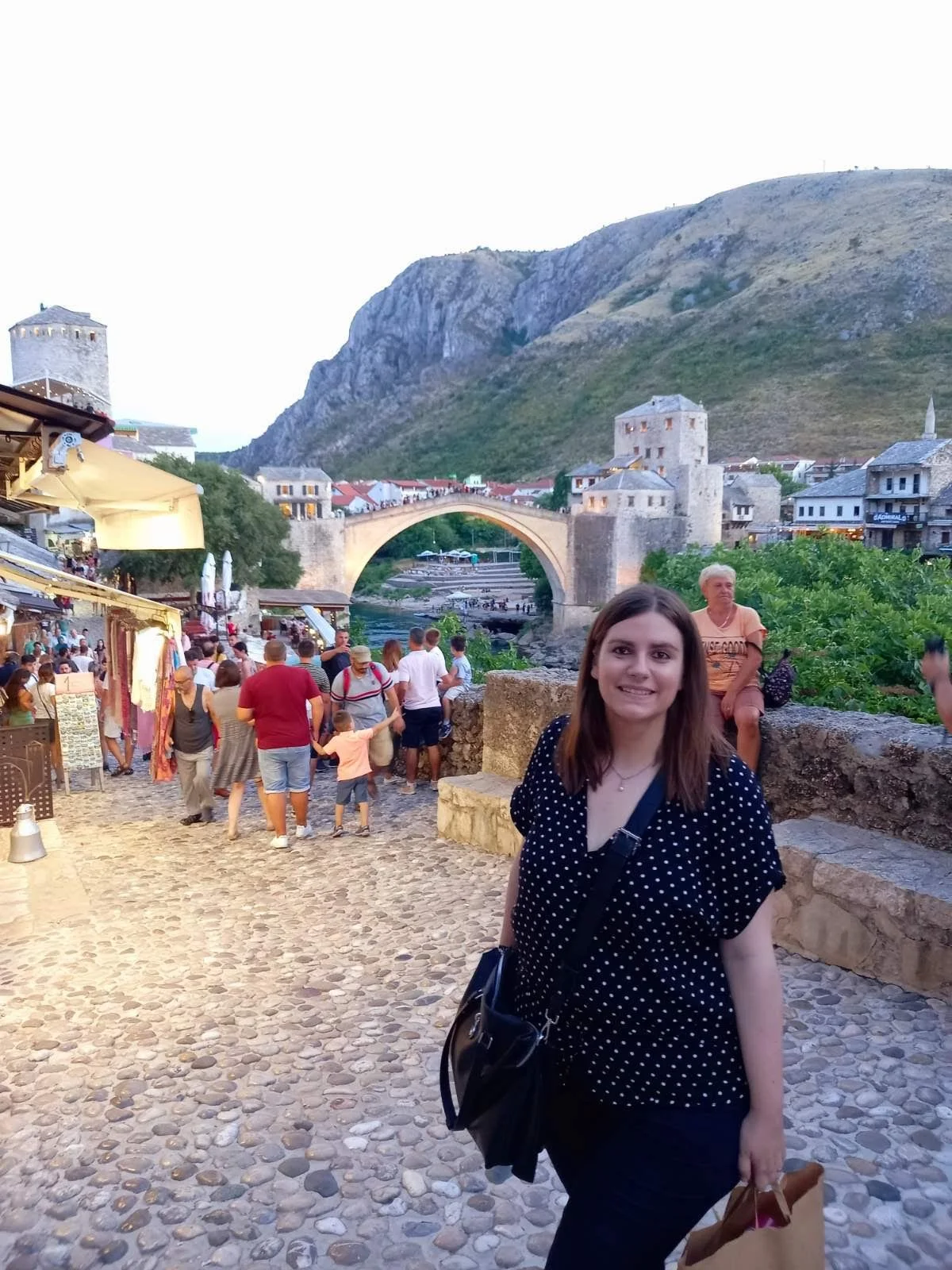Lejla Hasandedić-Đapo
Pronouns: She/Her
Organisations: United Religions Initiative (URI); Youth for Peace; European Interfaith Youth Network of Religions for Peace Europe
Country: Bosnia and Herzegovina
Profile
Lejla Hasandedić-Đapo is a dedicated peacebuilder originally from Mostar, Bosnia and Herzegovina. She currently lives in Ankara, Turkey. She has a background in clinical psychology research and practice. Lejla said she is driven by a desire to help people overcome traumatic experiences and contribute to peacebuilding efforts in the divided society of Bosnia. Lejla is an active member of the United Religions Initiative (URI), a global grassroots interfaith network that aims to bridge religious and cultural differences. She has taken on various roles within the organisation, including that of youth ambassador, European Liaison Officer and individual membership coordinator. In 2014, Lejla founded Youth for Peace, a youth-led organisation dedicated to encouraging meaningful youth participation and peacebuilding. She is also Vice President of the European Interfaith Youth Network of Religions for Peace Europe, which focuses on empowering young people within religious communities. In her current pursuit of a Ph.D. in Psychology at Ankara Yildirim Beyazit University, Turkey, Lejla focuses her research on the transgenerational transmission of trauma, a topic closely related to her peacebuilding efforts.
Story
Lejla Hasandedić-Đapo said her peacebuilding story begins in the Bosnian city of Mostar, where she grew up in a society scarred by war and division. Mostar’s famous UNESCO heritage site, the Old Bridge, which was destroyed during the war in 1993, serves as a symbolic division between Bosnians (predominantly Muslim) and Croats (predominantly Catholics), where mingling was scarce. In order to bridge these divisions, the European Union introduced an initiative – a secondary school strategically positioned in the city’s heart that aimed to unite students from both sides. Even though, according to Lejla, the effort was unsuccessful since students remained divided on different floors, the motivation behind the initiative sparked change. Lejla and her fellow students took the bold step of forming a Student Council and inviting peers to collaborate on projects aimed at improving the school. ‘We discovered that we have so much more in common than all these things that were dividing us on political and national issues’, Lejla said. This realisation was a first step on her peacebuilding journey.
Lejla founded the non-governmental, youth-led organisation Youth for Peace after having studied psychology and taken part in peacebuilding initiatives such as the United Religions Initiative; and European Interfaith Youth Network of Religions for Peace Europe. Youth for Peace is located in Sarajevo, but it also reaches out to smaller, divided communities across national lines, recognising the interdependence of the Balkan region’s turbulent history. Projects range from interfaith and intercultural discussions to youth camps, mentorship programmes and assistance to disadvantaged communities, addressing issues ranging from mental health to political involvement.
Lejla said the need for inner peace is a prerequisite for peacebuilding. She said that the war’s transgenerational trauma continues to influence the next generation, preserving old hatreds and prejudices. She said she believes that by first encouraging young people to address these stereotypes, people can contribute to the creation of a more peaceful society. The ultimate purpose of Youth for Peace is to promote sustainable, positive peace – striving for a society that is not only free of open conflict but also flourishes economically, socially and culturally. ‘We hope that by achieving this level of positive peace we will be able to help lower the level of corruption and make our country more sustainable. Then there will be less violent extremism present and in the end, we hope we will have a prosperous society with a brighter future in front of us,’ Lejla said.
She said she faces challenges in her peacebuilding efforts, from corruption to not being taken seriously due to the youth-led nature of her organisation. Some of her peers remain entrenched in nationalism and prejudice, unable to break free from their past. Despite these obstacles, she finds motivation in creating a better world for her son and in the personal triumphs she has already achieved. Lejla said she believes her personal growth and recognition from international organisations validate her dedication and offer a platform to share impactful initiatives: ‘I was working on myself and trying to overcome all these terrible things that happened [to me], in order to bring change and be a motivation and inspiration for others’, she said.
Lejla’s message to those who wish to follow in her footsteps is simple: start today, no matter how small your actions may seem. Every effort to overcome divides can have a profound impact. ‘Just start and believe that every work that is coming from your heart, that you are passionate about, will be meaningful’, Lejla said.



